Rexx Arkana, with whom we recently spoke about his love for classic synthpop, isn’t just indulging his passion via his new Coldkill project. Rexx has his ear to the ground as much as anyone, and while in the UK dug in deep with newcomers Empathy Test.
“Men’s finest works bear the persistent mark of pain. What would there be in a story of happiness? Only what prepares it, only what destroys it can be told.”
The Immoralist, André Gide
“Art never comes from happiness.”
Choke, Chuck Palahniuk
“These terrible silences, these horrific injuries are, simply where I find myself now.”
“Where I Find Myself”, Empathy Test
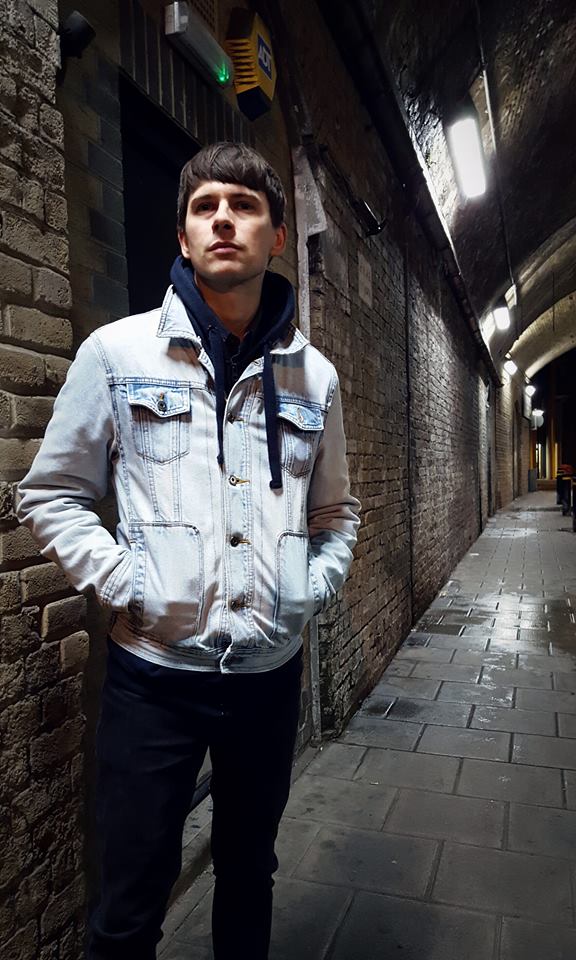
It’s funny: sat across from him at Draft House in the shadow of Tower Bridge in London’s Southwark Borough, Isaac Howlett doesn’t seem the sad sort. Truth be told, as I mentally mark him sipping from his spicy tomato juice (that’s “toe-mott-toe” for our British readers), I can’t help but envy him a little. He has much that I want: youth, health, charm and a vocal range this author/singer can only ever dream about possessing.
Yet, Howlett – the emotive front man for spectacular UK pop act Empathy Test, relative newcomers to the music scene – writes introspective epodes on par with history’s most metaphorically mournful. It’s no surprise, then, to hear him cite The Cure’s Robert Smith as his favorite vocalist. Fact is, if anyone knows anything about being emo, it’s yours truly; and as a fellow artist and occasional malcontent, I am both appreciative and envious of Howlett’s compositional adroitness.
“I love sad songs and I love writing them,” Howlett confesses. “I find it easier. Happy songs are impossible to write and have not be cheesy or throwaway. So, I think even the best happy songs aren’t entirely happy. I have one song that springs to mind when people ask ‘do you have any happy songs?’ and it’s still got the word ‘misery’ in it. (laughs)”
Howlett’s formative years lack the sort of easily attributable traumas, the psychological side effects of which one might easily excuse, and instead might feel familiar to many of us in our shared experiences. He was born southeast of London in Maidstone, county of Kent, seat of the Archbishop of Canterbury, leader of the Church of England. Howlett found himself in the sole guardianship of his mother at a young age when his parents divorced. Soon after, she remarried and quickly began building a new family, the residual emotional implications of which the singer/songwriter has only recently begun to explore.
“People always ask about your inspirations because they want to know how you arrived where you arrived or whatever. I find it a really difficult question to answer. I always say just ‘human relationships, human interactions,’ but obviously that doesn’t explain how much raw emotion is in there.”
“Over the last couple of years, I’ve come to realize that I have been depressed for some time and that I need to sort something out,” he offers honestly. “Apparently, depression runs in the men on my mother’s side [Howlett already has plans to use this line in a future song –rx.]. I sometimes feel like because of that, maybe I was a ticking time bomb…that it was always there waiting to happen at some point. That’s kind of a defeatist and fatalistic view, but it’s crossed my mind.”
“The weird thing is that it’s only now that I’ve begun to understand any of it, really,” he contemplates. “The thing that’s going to be interesting to any of our fans reading this interview is that it’s all in there…in our songs. They don’t even have to dig that deep. On the album there’s going to be lots of this story.”
“Man is extraordinarily clever in preventing himself from being happy; it would seem that the less able he is to endure misfortune the more apt he is to attach himself to it.”
Journals, André Gide
“By the time you’re thirty, your worst enemy is yourself.”
Choke, Chuck Palahniuk
“Flipping through yesterday’s news, slipping my neck into the noose again. Well, it fits so well.”
“Throwing Stones”, Empathy Test
Like life itself, Empathy Test hasn’t come easy. The road to band-hood has been a rough one; far from the ethereal tunnel of trees alluded to in the funereal euphoria of “Here Is The Place”, one of the group’s best tracks and a literal memorialization of Egerton, the small village some twenty miles from Maidstone, where he grew up.
Adam Relf is the project’s older, pragmatic partner, whose production experience lends the group their electronic edge. While Howlett self-identifies as an acoustic guitarist, Relf’s realm has been more underground dance, breaks and club culture.
The two met in Maidstone twenty five odd years ago, when Relf was about eight and Howlett a couple of years younger. Sharing a mutual love for comic books and science fiction – the band’s name is a reference to the Voight-Kampff test used by bounty hunters in Philip K. Dick’s Do Androids Dream Of Electric Sheep? and, more directly, Blade Runner – the pair spent a good part of their youth “climbing trees and playing with Star Wars figures.”
It was in school that Howlett first started to find himself in the limelight, though not always for the right reasons. “I was always performing as a kid and getting into trouble constantly,” he reflects. “Then I tried acting, but when I started secondary school, all the kids were playing guitars. I realized that this was a much better way of getting attention. Unlike acting, I didn’t have to learn lines and pretend to be someone else. I could be myself. Suddenly there was this desire to perform and luckily I had all this stuff to write songs about. I kind of realized why; I just wanted attention.”
“I can’t deny that the first album that I knew all the words to was What’s the Story, Morning Glory? by Oasis. Their songs were so simple and they were written on an acoustic guitar, which meant I could pick up my mother’s and try to work out how to play it. As soon as I could play three chords, I started writing my own songs.”
After secondary school, the teens took separate paths to university. Adam studied art in London, while Howlett went off to Norwich for his first serious lessons in literature and love. It was during this time that the two – on their own – continued their musical experimentation. “Adam, I think, was recording stuff on his Playstation and then his computer and I bought a second hand four track from a kid at school,” Howlett remembers.
“I learned to play the guitar just so that I could write songs. I have always steered clear of learning how to do things properly. I never bothered to learn scales or perfect the art of playing, because for me it’s just a vehicle. It’s kind of the same with songwriting as well. I’ve never looked for a formula. I keep things very simple. I write pop tunes that are basically A-B-A-B structure, sort of the purest form of a pop song. I would never call myself a musician. I have this kind of ability – even when I’m trying to mimic something – I never quite get it right. I believe that’s how I’ve managed to be original.”
“Adam is a perfectionist. He is definitely our quality control. He will not let anything leave his computer or go on the internet unless he’s 100% sure of it. If he put something out and someone said ‘that’s crap’, and he has any amount of doubt, then he will just scrap it. It has to be perfect in his mind, or as near perfect as it can be.”
After university, the two found themselves both back in London, but their first attempts at making music together disappointed. Relf had been writing and recording breakbeat tracks with a DJ friend of his under the moniker The Magnet Men before effectively being run off by the arrival of Arts Council England-sponsored act Magnetic Man in 2010. Reuniting with Howlett, he tried to layer his aggressive break beats with the songwriter’s guitar-based melodies, recording a half dozen tracks (and playing one show) that “didn’t really work” and which they would later scrap altogether.
The twosome had the right intent, but the wrong timing. Surrounded by failure, with little prospects for success in sight, Howlett sought a place to fall. Suddenly, and with scarcely a goodbye, he set off for Brighton.
“I’d been messing around in obscurity for so long,” Howlett explains. “I’d been living in London for seven years and my life basically fell apart. I couldn’t face another winter in this city starting from scratch: homeless, jobless, band-less, girlfriend-less. So, I just deconstructed my whole life and went off to Brighton. At the time it was the only place I could think of that I could live. Plus, there was a girl there…I hate to admit it.” [There’s -*always* a girl –rx.]
After Brighton came Barcelona, where Howlett taught English language courses for a period. He tried to stay active musically in Spain, but it all felt a bit too much like holiday. In relatively short order, the singer was packing his bags and heading back to England, unsure of what awaited him. In actual fact, the best was yet to come.
“There is no feeling so simple that it is not immediately complicated and distorted by introspection.”
Pretexts: Reflections on Literature and Morality, André Gide
“The trick to forgetting the big picture is to look at everything close-up.”
Lullaby, Chuck Palahniuk
“If you care for me at all, you’ll hang up when I call. You’ll clear me the space to fall.”
“Losing Touch”, Empathy Test
“I never meant to start another band with Adam,” he says, “because I wasn’t even sure that he had forgiven me for disappearing when we were doing this other project. Then we met up again and things were okay and we were finally in a situation where we created music and I was like ‘Right, this is good. This could sell. I’m going to throw my back into it.’”
The situation Howlett refers to – again a metaphor for life – almost seemed to sort itself. “That year, I was working in a bar on New Year’s Eve. I came home at whatever ridiculous time in the morning and, rather than go to bed, I decided I’d watch Drive for the first time. In that state of still being a bit drunk and it being late at night, the movie had a really profound impact. It really had an effect on me.”
“So, basically everything just happened at the right time. We didn’t go ‘Right, let’s form a band and we’ll call ourselves X and make this kind of music.’ It wasn’t planned. We were just sitting in Adam’s room one night. I think we’d been on a very drunken night out and were just like crashed on his floor. I started in about how great the movie was and Adam agreed. Soon, we got to talking about the music and Adam said ‘We can make a track like that…easy.’ So we got up and we made “Losing Touch” there and then.”
“That was 2013,” Howlett continues. “We spent the rest of that year casually making another three tracks without any real idea what we were doing. We had four tracks before we even had a name. Then it was like we have an EP. We need to do something with it.” There was never major ambition. It was just like ‘let’s put it on Soundcloud and see what happens.’ But we needed a name.”
A brand identity on trend with society’s seeming obsession with all things 80s and four hook-y pop tracks were all Howlett needed to launch what to date has been about as meteoric a rise a band can have (and still remain unsigned). The artist leveraged his experience in marketing to perpetuate the group’s social media presence. It started with a Facebook page, a Twitter account and the posting of songs to Soundcloud. Soon, ET became an equal case study on how to do music well and how to successfully play the public relations game.
“I basically used Twitter to find us fans and contacts. I went out there and followed all the people who liked the bands that we wanted to be. Then I set up an auto-direct message reply for those who followed back telling them to check us out on Soundcloud and to like us on Facebook. That’s basically all I did, day in and day out, following as many people as I could. It’s just a numbers game.”
It worked. Interest in the band snowballed through word of mouth. (Even this author picked up on them through a recommendation from a friend.) Quickly, the size and reach of the bands audience grew – to over 8300 followers on both Facebook and Twitter as of press time. They’d barely settled on a name, recorded a scant four tracks, and had yet to even play out, but Empathy Test was about to stumble into something beyond their wildest dreams.
While his stepfather’s music collection introduced him to such associated artists as The Cure and The Smiths, Howlett has never been goth. Nor is Relf, who’s more club kid. Still, that they never aimed for it didn’t stop the band from drawing heavy attention from that scene, as evidenced in part by this article. Truth is, a certain segment of the dark scene has recently gravitated towards the same 80s retro revival as the burgeoning hipster minimal and synth wave scenes elsewhere. Something about this band has engendered favor from the culture collectively described by I Die: You Die as “our thing”; whether it’s the sparse atmospheres, the waves of melody, the plodding percussion, Howlett’s melancholic metaphors or a combination of all of the above. Though the duo might not have known the goth community, the goth community was getting to know them…and it would lead to their biggest moment as a band to date.
“We weren’t a live band for a long time because we couldn’t work out how we were going to do it,” Howlett remembers. “In the end, I decided I would play leads and Adam would run backing tracks from the laptop and we finally booked our first gig. It was at that point that this guy Robert (co-owner of Dresden’s Strasse E club) came out of the woodwork and said that he was coming to the show from Germany. At the time, I had no idea who he was or that he owned a club, but as it was our first ever gig, I thought that was amazing.”
“So, I’m standing at the bar after the show and this very tall, obviously German guy tells us that his name was Thomas and that he flew over from Germany to see us at the recommendation of his friend. It turns out that friend was this guy Robert and he and his girlfriend had missed their flight. Anyway, he says ‘I put on this little festival in Germany called Wave Gotik Treffen and I’m really interested in booking you.’ I said ‘that sounds really cool. Just send me an email or whatever,’ not knowing who or what it was.”
Howlett and Relf might not have been able to fully appreciate the magnitude of their good fortune just then, but one of their fans and future business partners sure did. (Now) NYC-based synth act We Are Temporary’s Mark Roberts was manning his own label at the time, Stars & Letters, with whom Empathy Test would release their second EP, “Throwing Stones” (They have since re-acquired the rights –rx). Roberts had heard “Losing Touch” and had begun advising the band early on.
“When I told Mark that we had talked to the guy from WGT, he lost his shit. For him, it was what he had been aiming for, so he told us how excited we should be about it. Then I looked it up. Not being a part of the goth scene, it was really weird for me. I wondered, ‘why do these people want us to come and play there?’ Because I just saw the pictures and it was like gas masks and crazy costumes.”
Though they might not have been able to rationalize the appeal of their music to the goth scene (something Howlett still wonders about), the opportunity was too good to pass up. They agreed not only to perform at the festival, but also took a gig offer from Strasse E to fly to Dresden and open for Kirlian Camera, with whom the duo was equally unfamiliar. Only their second ever show, they were understandably overwhelmed by the large venue when they first walked into the club.
All of the excitement and newness of being thrust into the spotlight was intoxicating to Howlett (the free shots at the bar might have had something to do with it–rx). “I got shitfaced the night before and the day of the show our driver was speeding around the city and stopping sharply at traffic lights. I had to get out of the car and throw up. By the time we got to the sound check, I was a shivering wreck.”
“In retrospect, that show was probably really brilliant but, like, just two guys standing on an incredibly big stage playing a laptop and singing. Thomas was there that night and he came up to us at the end and said ‘that was really good. I want five new songs before WGT.’ No pressure.”
If the two found Dresden overwhelming, performing at Treffen’s Kohlrabirzirkuz venue felt absolutely surreal. “We played probably the worst show we’ve ever played,” Howlett attests. “Here we were, a band who had done like four shows playing in this massive arena. We came offstage and we were shell-shocked. We couldn’t believe we had just fucked that up. It was like ‘we were handed this massive opportunity on a plate and we just fucked it up.”
“Then I remembered we had left this poor girl alone down at merch with this bag of CDs and shirts. When we went round there, there were like two hundred people swamping the stand. So, we dived behind there and for a solid half hour we were just tearing off cellophane and signing discs. We sold 200 CDs and almost all the t-shirts in half an hour and I thought ‘Right, we can’t have been that bad.’”
“Nothing prevents happiness like the memory of happiness.”
Autumn Leaves, André Gide
“People fall so in love with their pain, they can’t leave it behind. The same as the stories they tell. We trap ourselves.”
Haunted, Chuck Palahniuk
“You’ll never know how it hurts to fall so hard you see stars.”
“Seeing Stars”, Empathy Test
Since then, the band has augmented its lineup through the addition of two new players, drummer Chrisy Lopez – whose talent and ability have allowed the band to drop the drums from their backing tracks – and multi-instrumentalist Jacob Ferguson-Lobo, who also records his own original music under the moniker Lobo. It has “massively” changed the dynamic of their live show, Howlett attests, and transformed his ability to deliver as a front man.
“Everyone’s over people staring at laptops. Sure, we’ve got visuals, but essentially I’m the performer and I wanted to be doing more. Now they (Lopez and Ferguson-Lobo) are like the Alan Wilders of the band. They’re actual musicians and they’ve completely changed our energy on stage because I’m not stuck standing there pressing keys anymore. I am going to perform and I’m going to break down the barrier between us and the audience. There’s nothing blocking me. I’ve just got my mic stand and my microphone.”
Not only has the band’s lineup been an evolving proposition, but so has its musical stylings, something that gives Howlett pause given the overwhelming popularity of their debut single. The artist worries about being cast in the shadow of a signature song, particularly one that was off the mark.
“We basically set out to make synthwave,” he explains, “like the kind of stuff we’d heard on the Drive soundtrack. It is a massive cliché, but it’s the truth. Essentially, we didn’t get it quite right. So it was kind of a happy accident almost that it went down so well.”
“We’ve ended up with a big fan base in that area, particularly in Germany, but it wasn’t really what we expected. It wasn’t the audience we were aiming for and so there is a certain amount of evolution going on. I think we’ve always been moving away from that very basic synthpop sound that we created towards a more modern, cutting edge electronica. Even on the second EP with “Throwing Stones,” that was probably nearer what we meant to do first time round, but we didn’t quite hit it.”
“There is a right balance of romance, emotion and darkness,” Howlett suggests. “What we try to do in Empathy Test is hit that balance every time. Really, that’s what Adam and I are about: we wanted to be this cool, Drive-soundtrack kind of band. The problem is, that’s not really us, because we’re not cool. We try our best, but we’re not hipsters. So, everything I do is always sort of borderline…cheese…emo. It’s always on the edge of being cheesy because I have no filter. I just sing about the things that really move me. And you can’t fake that.”
“The good thing about the analog synth sounds we’ve found is that they stop things from being cheesy. They sort of accentuate the emotion of my songs. If we were, like, a folk band or a straight up pop band singing those songs, it all would be a bit weird. Or they’d just be too saccharine. The sound that we’ve chosen works because it invokes the same sort of feeling that you get when you watch Close Encounters or all those films that we loved growing up. It’s nostalgic.”
Empathy Test’s nostalgic tones have struck multiple chords. As a band, they are big melodic swaths of rich harmonics, painted with an analog vibrancy that provides the ideal bed for Howlett’s resonant lamentations. Their lush symphonic backgrounds spread frequencies for Howlett’s streams of self-deprecation – which exhibit influences of both Molko and Morrissey, but thankfully never fall quite as nasally or self-indulgent. Put simply – not ironically – Empathy Test make you feel something.
Their music has been featured in programming on both MTV’s Catfish and VICE on HBO. They’ve toured in support of Mesh and Aesthetic Perfection, which they’ll do again in the spring. They’ve even been featured on the BBC and national television in Germany. Just about the only thing that they have not gotten is…signed.
“The plan I had in my head,” Howlett says, “was that we’d release the first EP ourselves, the second on an indie label and the album on a major. Ambitious maybe, but why the hell not? When things all sort of seemed to be falling into place, I thought ‘holy shit, this is actually happening.’ So we quickly made the second EP. That said, it took a little longer than I expected. Same now with the album.”
“We’ve had a range of offers, mostly from Germany because that seems to be where we have the most traction. But we’ve been doing things our own way from the beginning. These days when you can do so much yourself, there’s actually very little that a record label can offer you, especially a small label. It doesn’t weigh up. It doesn’t balance out what you’re giving up.”
“We don’t have a plan to remain unsigned,” he continues. “It’s a plan to not sign unless it’s worth our while. Ideally, we wanted to sign with a cool UK indie label. If someone like Mute came along, because they have the greats but they also have cool up and coming acts, that would be ideal. So, if anyone from Mute’s reading… (laughs)”
For now, Empathy Test walk their own path. The new single, “By My Side”/”Vampire Town” – featuring stellar remixes from Papertwin and New Portals – arrives February 17th, self-released by the band on vinyl and digital versions via their Bandcamp. The same night they perform at Pluswelt’s “Synthpop Goes Berlin” event, a two day mini festival featuring the likes of Mesh, De/Vision, Beborn Beton and more. By spring the band plans to launch a Pledge Music campaign to fund a 23 June release of their full length debut album, as yet untitled. To borrow a sentiment from their inspirational 80s era, the future looks bright for Howlett and his mates.
It’s all finally starting to come together for Howlett, but that doesn’t entirely silence the self-doubt. “We could put out an album that’s ten new tracks. What if they don’t love those tracks as much as they loved the old ones? What if we release this album and it’s a dud, because it’s not like those two EPs that we released before. There’s a lot of thinking to be done. Whatever we do is not going to be right for everyone, so we just gotta do what we feel. There is a part of me that just wants to release a new record with all new tracks, because maybe we’re finding a new audience. But then I also don’t want to upset those who’ve been with us.”
That’s Howlett in a nutshell: ambitious but unsure, opinionated but insecure, guarded but optimistic. It’s his depth of feeling, his empathy, that makes him so human. And it’s his humanity that speaks volumes, that enraptures so many through his song. I remark that, so far, all of his stories seem to have happy endings.
Howlett thinks for a moment.
“I think that’s what Empathy Test is about existentially,” he smiles. “It’s admitting to sadness and finding strength, unity and hope. Pure emotion is uplifting. I hope that’s why people like us as much as they do, because we are pure emotion.”

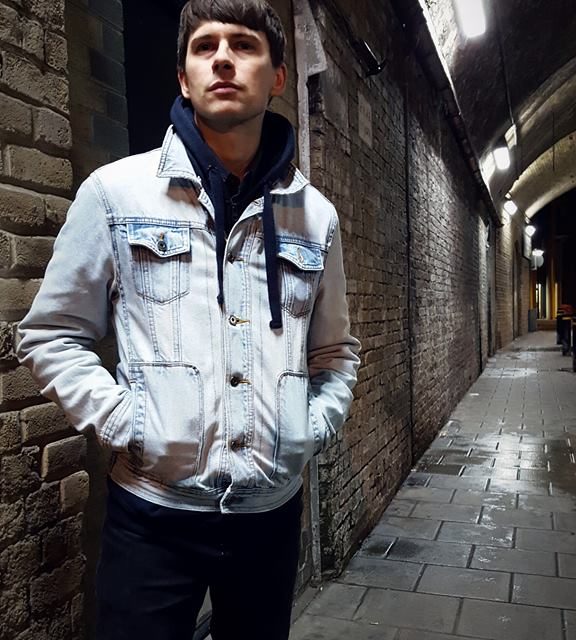

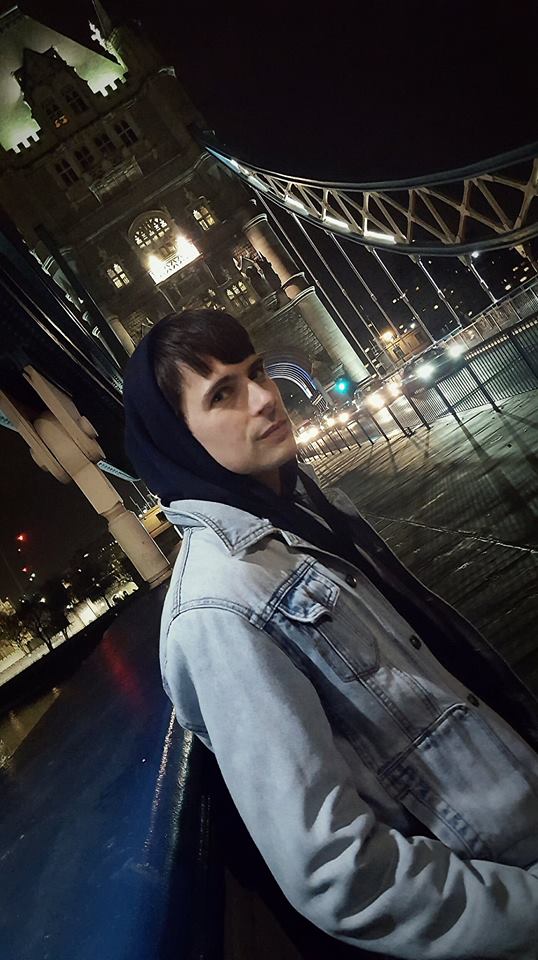
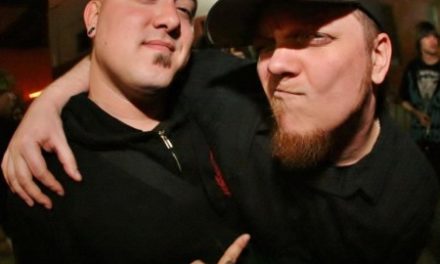
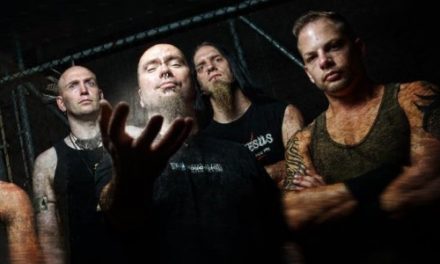
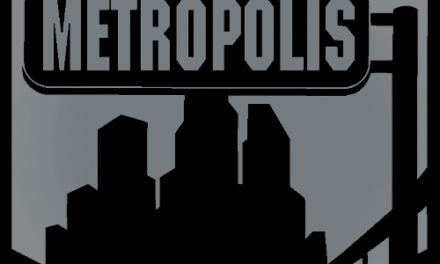

Trackbacks/Pingbacks